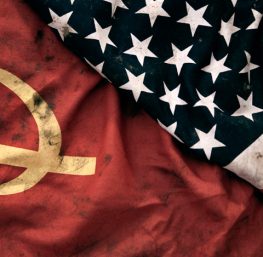American Thinker | by J. Robert Smith | Sep. 29, 2009
Less than a year into his presidency, Barack Obama’s world grows bleaker. Liberalism’s world is bleaker. At home and abroad, liberalism, as advanced by the President, is failing. Are we witnessing the beginnings of another historic event, loosely comparable to the fall of communism twenty years ago? Now the fall of liberalism?
Remember, at the beginning of the 1980s, no one would have predicted that by the decade’s close the Berlin Wall would fall, communism would be discredited and the Soviet Union would be less than a couple of years away from dissolution.
Though no conservative worth his salt is surprised by liberalism’s shortcomings, the rapidity of its failure is surprising. More importantly, it’s alarming, for though the effects of liberalism’s failure are damaging to us at home, they may prove terrible to us abroad.
Step back to consider. What’s working for Mr. Obama and the Democrats?
Despite the Democrats’ interventions, an anemic economy promises nothing more than a tepid recovery, if that. Democrats are indebting the nation to the tune of trillions of dollars. The greenback has been debased. Serious inflation is coming, and that inflation will trigger another economic downturn, one that might be sharper and deeper than we’re now experiencing.
What commonsense American believes that mountains of debt and looming inflation are good for a struggling economy? More to the point, if a party has a sober worldview and a solid grasp of recent history, how can it possibly legislate policies and spending that must have disastrous consequences?
Well, it can’t. But Democrats can. They long ago raised liberalism to dogma. Reality is off-limits to the faithful.
The economic policies of Lyndon Johnson and Jimmy Carter were disasters, culminating in bitter years of stagflation. Rather than learning from those calamitous years, and from the subsequent Reagan years, when the damage was undone and the economy righted, liberals stubbornly insist on another go, as if their earlier failures were simply a matter of flawed execution.
Today, President Obama flirts with protectionism. He recently slapped sanctions on Chinese tires to appease union bosses. Free trade agreements with Colombia and other nations shamefully languish in Congress. Protectionism not only hurts consumers and producers, but could spark conflict abroad.
Evidently, currying favor with a key constituency — unions — is of greater importance to Mr. Obama than the economic and national security ramifications of protectionism. The Smoot-Hawley Act, which built the economic equivalent of the Berlin Wall around the American economy, is increasingly understood as the trigger for the Great Depression.
History points to the advantages of open trade, not a closed economy. Oddly, on this score, liberals are embracing Herbert Hoover.
The President’s advocacy of government-controlled healthcare is another testament to belief over reality. In Canada and Great Britain, socialized medicine has proven to be expensive, inefficient, deficient (rationing) and, at best, mediocre. Proposals for it here are proving to be broadly and intensely unpopular. Yet, the President forges ahead.
In the Senate, Majority Leader Harry Reid threatens to invoke an arcane budget resolution rule to pass healthcare reform if he can’t round up sixty votes to end debate to move the matter to a final vote. Senator Robert Byrd (D-WV), who authored the budget resolution rule, has flatly stated that using it to pass healthcare reform would be a gross misapplication and a disturbing precedent.
But this is what liberals are down to: ignoring the will of the majority and bending rules to impose a takeover of healthcare on Americans.
A political party with principles and ideas that resonate with voters doesn’t need to ignore the people, nor does it need to resort to parliamentary chicanery to win a result. It speaks tellingly of the weakness, not the strength, of modern liberals that they’re willing to end-run the popular will.
But it’s overseas where liberalism, as expressed through Mr. Obama’s foreign policy, poses great dangers to the Republic. In truth, the question now isn’t will the United States pay a terrible price for the President’s policies, but when.
Mr. Obama took to the world stage in January sporting sackcloth and ashes. His public confessions for alleged American misdeeds and arrogance were designed to win the absolution of offended allies and enemies alike.
The United States will no longer lead, Mr. Obama all but declared. Instead, it will step down to join the crowd. Good will and fellowship, dialogue and negotiation, accommodation and consensus, shall bring civility and peace to a fractious world.
But reality, that cruel lover, has other ideas. The President’s bended knee and olive branches are being met with sneers and cold contempt by rogues. His measure has been taken, and he’s deemed weak. And, by extension, so is liberalism, which governs his actions.
The President unilaterally withdrew elements of missile defense from the Poles and Czechs. His gesture was met immediately by the Russians with cool disdain. The Russians, historically a brutal people with a taste for domination, see the President’s action as craven; it will embolden them to push for more concessions, perhaps concerning Georgia or even the Ukraine. The Chinese are no less likely to test the President’s mettle. Taiwan could be in China’s crosshairs.
[…]
In less than nine months time, the time of Mr. Obama’s tenure, a bad economy remains bad, with the prospect of getting worse. Overseas, the nation’s enemies, who only a short time ago feared us, now scheme to overtly or surreptitiously challenge us. Our allies in Europe, Asia and the Middle East, some of whom resent our power, must confront an ugly question: What happens in a world absent sufficient projections of American power?
But make no mistake. This is not only the faults and failings of a man, Barack Obama, but of the worldview and philosophy he embodies. Liberalism in action is again proving to be a dismal and dangerous failure. This time, though, its margin for error is greatly diminished. Hence, the nation faces greater risks.
The only way for liberalism to work is if it stops being liberalism. What are the odds of that happening?
. . . more



